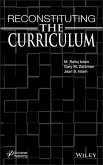Education for Responsibility (eBook, ePUB)


Alle Infos zum eBook verschenken

Education for Responsibility (eBook, ePUB)
- Format: ePub
- Merkliste
- Auf die Merkliste
- Bewerten Bewerten
- Teilen
- Produkt teilen
- Produkterinnerung
- Produkterinnerung

Hier können Sie sich einloggen

Bitte loggen Sie sich zunächst in Ihr Kundenkonto ein oder registrieren Sie sich bei bücher.de, um das eBook-Abo tolino select nutzen zu können.
Changing your mind to change the world is the general principle proposed to educate for responsibility. Using an interdisciplinary scientific approach, this book dissects the functioning of the ego, that is to say the belief in a self, an illusion that causes disharmony. After an original modeling of the notion of responsibility, the author deduces that it is incumbent on all of us to become aware of the relationship between our own minds and the world. Thus, gaining consistency and awareness, everyone would have the potential to free themselves from the illusion of the ego and contribute to a…mehr
- Geräte: eReader
- mit Kopierschutz
- eBook Hilfe
- Größe: 1.47MB
![The Meaning of Otherness in Education (eBook, ePUB) The Meaning of Otherness in Education (eBook, ePUB)]() Muriel BrianconThe Meaning of Otherness in Education (eBook, ePUB)139,99 €
Muriel BrianconThe Meaning of Otherness in Education (eBook, ePUB)139,99 €![Reconstituting the Curriculum (eBook, ePUB) Reconstituting the Curriculum (eBook, ePUB)]() M. R. IslamReconstituting the Curriculum (eBook, ePUB)84,99 €
M. R. IslamReconstituting the Curriculum (eBook, ePUB)84,99 €![Educational Neuroscience (eBook, ePUB) Educational Neuroscience (eBook, ePUB)]() Educational Neuroscience (eBook, ePUB)21,99 €
Educational Neuroscience (eBook, ePUB)21,99 €![The Wiley Handbook of Educational Supervision (eBook, ePUB) The Wiley Handbook of Educational Supervision (eBook, ePUB)]() The Wiley Handbook of Educational Supervision (eBook, ePUB)183,99 €
The Wiley Handbook of Educational Supervision (eBook, ePUB)183,99 €![The Wiley International Handbook of History Teaching and Learning (eBook, ePUB) The Wiley International Handbook of History Teaching and Learning (eBook, ePUB)]() The Wiley International Handbook of History Teaching and Learning (eBook, ePUB)170,99 €
The Wiley International Handbook of History Teaching and Learning (eBook, ePUB)170,99 €![Positively Smarter (eBook, ePUB) Positively Smarter (eBook, ePUB)]() Marcus ConyersPositively Smarter (eBook, ePUB)18,99 €
Marcus ConyersPositively Smarter (eBook, ePUB)18,99 €![The Wiley International Handbook of Educational Foundations (eBook, ePUB) The Wiley International Handbook of Educational Foundations (eBook, ePUB)]() The Wiley International Handbook of Educational Foundations (eBook, ePUB)177,99 €
The Wiley International Handbook of Educational Foundations (eBook, ePUB)177,99 €-
-
-
Dieser Download kann aus rechtlichen Gründen nur mit Rechnungsadresse in A, B, BG, CY, CZ, D, DK, EW, E, FIN, F, GR, HR, H, IRL, I, LT, L, LR, M, NL, PL, P, R, S, SLO, SK ausgeliefert werden.
- Produktdetails
- Verlag: John Wiley & Sons
- Seitenzahl: 336
- Erscheinungstermin: 9. Juli 2019
- Englisch
- ISBN-13: 9781119644279
- Artikelnr.: 58582307
- Verlag: John Wiley & Sons
- Seitenzahl: 336
- Erscheinungstermin: 9. Juli 2019
- Englisch
- ISBN-13: 9781119644279
- Artikelnr.: 58582307
- Herstellerkennzeichnung Die Herstellerinformationen sind derzeit nicht verfügbar.
Introduction xvii
Chapter 1. The World as a Reflection of the Mind 1
1.1. Definitions of the terms 1
1.1.1. Notions of world 1
1.1.2. Notions of mind 5
1.1.3. Gnoseological hypothesis, notions of consciousness and the model of
the mind 6
1.2. The objective world as an epistemological and societal reflection of
the collective mind: an example of science 17
1.2.1. Paradigms and projections in science 18
1.2.2. Examples of projection by a collective mind onto the objective world
20
1.2.3. Overview: the scientific world, a reflection of scientists' minds 24
1.3. The subjective world as a psychological and phenomenological
reflection of the individual mind 25
1.3.1. The basic mechanisms of the world-mind relationship 25
1.3.2. The four horsemen of the individual relative mind 38
1.4. Integrating the model of the relationship between the relative world
and the mind 83
1.4.1. Metaphysics of the strawberry tartlet 84
1.4.2. The ego, mediator of the reflection of the subjective world through
the individual relative mind 89
1.4.3. An example: stereotypes, prejudices and violent radicalizations 94
Chapter 2. Responsibility and Functioning of the Mind 103
2.1. Introduction: an overview of the tone of current research on
responsibility 103
2.2. Responsibility as a dialogical relationship between the outer and
inner worlds: ethical perspectives 105
2.2.1. Problem of responsibility in the field of ethics 105
2.2.2. Responsibility approaches in the field of ethics 108
2.3. Responsibility as a consciousness connected to oneself, others and the
non-human environment (NHE): psychological and phenomenological points of
view 110
2.3.1. Cognition and responsibility 110
2.3.2. Orientation and responsibility 117
2.3.3. Emotions, relationships and responsibility 123
2.4. Assessment: criteria for guiding towards responsibility 127
2.4.1. Coherence 128
2.4.2. The motivation for innovation 130
2.4.3. Harmony 134
2.4.4. Horizon of an education for responsibility 147
Chapter 3. Education for Responsibility Guidelines 161
3.1. Reflexivities 161
3.1.1. Cognitive reflexivity 162
3.1.2. Dialogical reflexivity 164
3.1.3. Phenomenological reflexivity 166
3.1.4. Objectives and material for the implementation of these
reflexivities 169
3.2. Meditation 174
3.2.1. Meditation and its phenomenological effects 174
3.2.2. Clinical protocols and practices including meditation 180
3.2.3. Techniques related to meditation 183
3.2.4. Psychobiological effects of meditation 184
3.2.5. Effects of meditation in school and university contexts 191
3.3. General principle: reflexivities, meditation and responsibility 193
3.3.1. Meditation and dialogical reflexivity would synergistically promote
phenomenological reflexivity 193
3.3.2. Phenomenological reflexivity promotes empathy and relatedness by
instantiating harmony 197
3.4. Summary of the competences targeted in responsibility education 203
3.4.1. Notion of competence 204
3.4.2. Emotional competences 206
3.4.3. Epistemic competences 209
3.4.4. Attentional competences 211
3.4.5. Relational competences 213
3.4.6. Axiological competences 214
3.4.7. Summary of the progress within the five types of competences 219
3.5. Integrating model of psychospiritual competences targeted in education
for responsibility 224
Chapter 4. Discussion 229
4.1. Education for responsibility, ethics and spirituality 230
4.2. Limitations of this approach 232
4.2.1. Obstacles in the French context 232
4.2.2. Some limitations of the proposed model 235
4.3. Education for responsibility and happiness 237
4.3.1. Stopping the illusion of ego and lasting happiness 238
4.3.2. Connections between education for responsibility and positive
psychology 241
4.4. Building knowledge and practical implementation in education for
responsibility 245
4.4.1. Summary of the present argumentation 245
4.4.2. Epistemological, pedagogical and research perspectives 248
4.4.3. Afterword 254
Postface 257
References 261
Index 289
Introduction xvii
Chapter 1. The World as a Reflection of the Mind 1
1.1. Definitions of the terms 1
1.1.1. Notions of world 1
1.1.2. Notions of mind 5
1.1.3. Gnoseological hypothesis, notions of consciousness and the model of
the mind 6
1.2. The objective world as an epistemological and societal reflection of
the collective mind: an example of science 17
1.2.1. Paradigms and projections in science 18
1.2.2. Examples of projection by a collective mind onto the objective world
20
1.2.3. Overview: the scientific world, a reflection of scientists' minds 24
1.3. The subjective world as a psychological and phenomenological
reflection of the individual mind 25
1.3.1. The basic mechanisms of the world-mind relationship 25
1.3.2. The four horsemen of the individual relative mind 38
1.4. Integrating the model of the relationship between the relative world
and the mind 83
1.4.1. Metaphysics of the strawberry tartlet 84
1.4.2. The ego, mediator of the reflection of the subjective world through
the individual relative mind 89
1.4.3. An example: stereotypes, prejudices and violent radicalizations 94
Chapter 2. Responsibility and Functioning of the Mind 103
2.1. Introduction: an overview of the tone of current research on
responsibility 103
2.2. Responsibility as a dialogical relationship between the outer and
inner worlds: ethical perspectives 105
2.2.1. Problem of responsibility in the field of ethics 105
2.2.2. Responsibility approaches in the field of ethics 108
2.3. Responsibility as a consciousness connected to oneself, others and the
non-human environment (NHE): psychological and phenomenological points of
view 110
2.3.1. Cognition and responsibility 110
2.3.2. Orientation and responsibility 117
2.3.3. Emotions, relationships and responsibility 123
2.4. Assessment: criteria for guiding towards responsibility 127
2.4.1. Coherence 128
2.4.2. The motivation for innovation 130
2.4.3. Harmony 134
2.4.4. Horizon of an education for responsibility 147
Chapter 3. Education for Responsibility Guidelines 161
3.1. Reflexivities 161
3.1.1. Cognitive reflexivity 162
3.1.2. Dialogical reflexivity 164
3.1.3. Phenomenological reflexivity 166
3.1.4. Objectives and material for the implementation of these
reflexivities 169
3.2. Meditation 174
3.2.1. Meditation and its phenomenological effects 174
3.2.2. Clinical protocols and practices including meditation 180
3.2.3. Techniques related to meditation 183
3.2.4. Psychobiological effects of meditation 184
3.2.5. Effects of meditation in school and university contexts 191
3.3. General principle: reflexivities, meditation and responsibility 193
3.3.1. Meditation and dialogical reflexivity would synergistically promote
phenomenological reflexivity 193
3.3.2. Phenomenological reflexivity promotes empathy and relatedness by
instantiating harmony 197
3.4. Summary of the competences targeted in responsibility education 203
3.4.1. Notion of competence 204
3.4.2. Emotional competences 206
3.4.3. Epistemic competences 209
3.4.4. Attentional competences 211
3.4.5. Relational competences 213
3.4.6. Axiological competences 214
3.4.7. Summary of the progress within the five types of competences 219
3.5. Integrating model of psychospiritual competences targeted in education
for responsibility 224
Chapter 4. Discussion 229
4.1. Education for responsibility, ethics and spirituality 230
4.2. Limitations of this approach 232
4.2.1. Obstacles in the French context 232
4.2.2. Some limitations of the proposed model 235
4.3. Education for responsibility and happiness 237
4.3.1. Stopping the illusion of ego and lasting happiness 238
4.3.2. Connections between education for responsibility and positive
psychology 241
4.4. Building knowledge and practical implementation in education for
responsibility 245
4.4.1. Summary of the present argumentation 245
4.4.2. Epistemological, pedagogical and research perspectives 248
4.4.3. Afterword 254
Postface 257
References 261
Index 289







